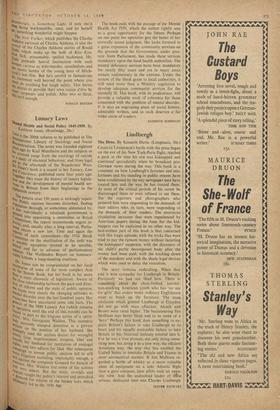Lunacy Laws
ketital Health and Social Policy 1845-1959. By Kathleen Jones. (Routledge, 28s.) Tats is the 100th volume to be published in The international Library of Sociology and. Social v.ecoostruction. The series was founded eighteen Os ago by Karl Mannheim and the subjects.so tn* Covered range from the sociology of suicide 7,4 study of electoral behaviour, and from legal to the aftermath of the Napoleonic Wars. Jones's book is a sequel to her Lunacy, Law T Conscience, published some four yealers a. go. egether they trace the history of lunacy gisla- vi41 and the development of mental health ser- ete,,elk, in Britain from their beginnings in the
Isfireenth century.
4,-lhe pattern over 150 years is strikingly repe.ti- ex' Public opinion becomes disturbed, finding a rfreSsiOB through, or sometimes stimulated by, 't'A' individuals; a reluctant government is cressed into appointing a committee or Royal f:rilittlission; the report recommends urgent re- ine nls;; and, usually after a long interval, P. arlia- retlt enacts a new law. Time and again the "clts of such committees—the 1934. Brock a"aunittee on the sterilisation of the unfit .was ble exception—proved to be. sensible, 0,'ar and far in advance of parliamentary nal111'n. The Wolfenden Report on homosex- ''Y follows a long-standing tradition. &tin,l)r. Jones can be congratulated on her lucid on"tnaries of some of the more complex Acts than thea Statute Book, but her book is far more the close Mere chronicle of legislation. Aware of
tin relationship between the pace and di
. rec- thtt of .reform and the state of public opinion, e traces very clearly the changing attitudes to researches have uncovered some odd facts. The nittes's of the 1890 Lunacy Act (which remains tra°Peration until the end of this month) can b. e ealckeid in part to the litigious antics of a spirit- Mrs. Georgiana Weldon. This eccentric awr narrowly escaped detention in a private r'n um on the petition of her husband. She arrilVtlY sued the asylum doctor for wrongful 4s JR• false imprisonment, trespass, libel and nthaalt, her husband for restitution of conjugal camps two editors for libel. Her subsequent 4101.134,1.go to arouse public opinion led to still litigation including, improbably enough, a eon' against the composer Gounod for breach of andtract. Mrs. Weldon lost some of the actions pt) .‘:''on others. But the trials, re-trials and a de'l's caught the public's interest and provoked
Illand for reform of ttl the lunacy laws which ately led to the 1890 Act.
The book ends with the passage of the Mental Health Act 1959, which the author rightly sees as a great opportunity for the future. Perhaps on one point her optimism gets the better of her normally sound judgment. She looks forward to a great expansion of the community services on the grounds that the Government, under pres- sure from Parliament, has made these services mandatory upon the local health authorities. The mental deficiency services have been mandatory for nearly fifty years and yet in many areas remain rudimentary in the extreme. Under the system of the block grant to local authorities, it will need more than a Ministry regulation to develop adequate community services for the mentally ill. This book, with its predecessor, will provide a valuable work of reference for those concerned with the problem of mental disorder. It is also an engrossing piece of social history, admirably written, and as such deserves a far wider circle of readers.
KENNETH ROBINSON






































 Previous page
Previous page